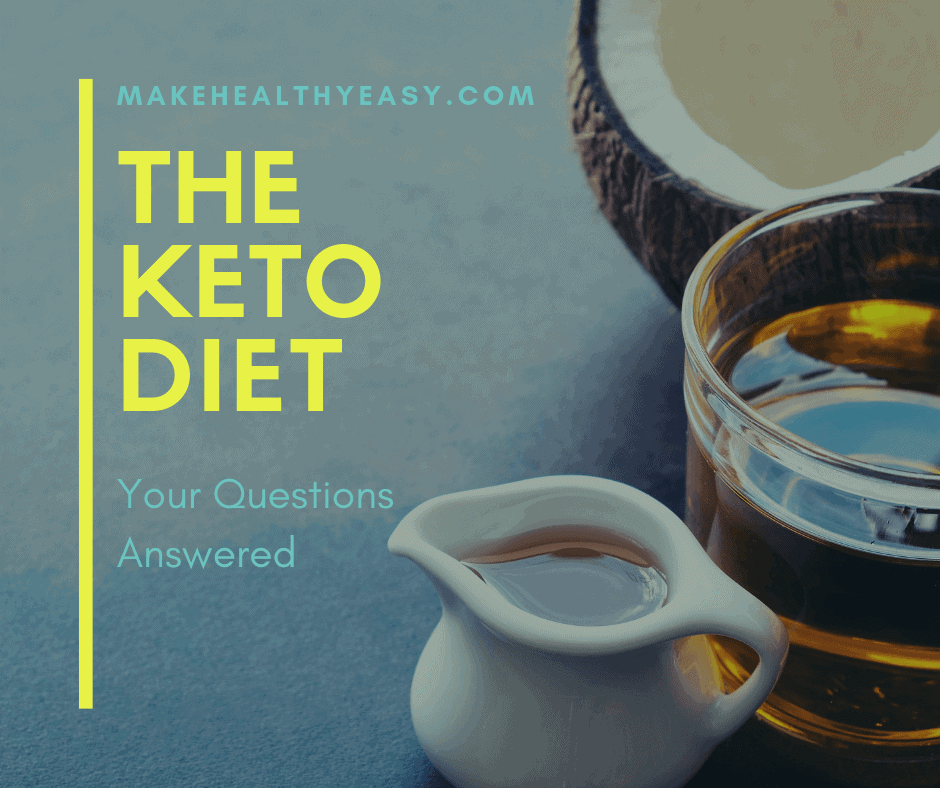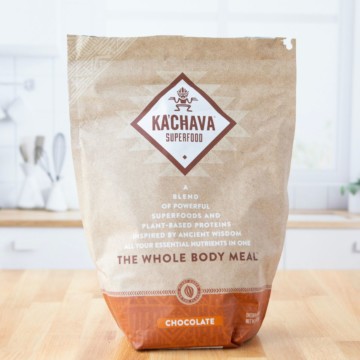
Disclaimer: This post is the result of my efforts to research accurate and up-to-date information on the keto diet. I did not intentionally leave out any studies or research while compiling my answers to prove a point one way or the other. The point of this post is to equip you with science-based knowledge about the keto diet so that you may be well informed.

I'll be honest with you: when a diet becomes super popular I tend to sit back, watch and wait before I get any skin in the game. Sometimes trends fade out as quickly as they appeared in popularity, and then sometimes they stick around and grow, and grow and grow in popularity.
The keto diet is becoming the latter and is so pervasive that it seems many people feel they HAVE to be on it to. This is basically like the Bat-signal for me, alerting me that it's time to speak up and help people navigate this eating style.
So consider this post my theoretical putting on of my Bat-Girl costume (I was always a huge fan of Bat-Girl btw) and coming to your aid to equip you with what you need and want to know about the keto diet.
Earlier this year I was asked to be on First Coast Living to talk about the Keto Diet. To prepare, I polled my Facebook followers for questions they had about keto. It was so helpful and I used this to prepare for my segment, which you can watch below. I decided to use them here as well to be the outline, making it quick and easy to find the answer you are looking for about the keto diet.
Here's the TV segment, which goes over the down and dirty of the Keto diet:
What is the Keto Diet?
The keto diet is short for ketogenic diet and is a style of eating that focuses on a very high fat intake and very low carbohydrate intake. The percentage of calories should be around 75-80% fat, 10-15% protein, and 5-10% carbohydrate. There are many variations of these distributions, but the point is that it's high fat. The "classic" version of the ketogenic diet is 4 parts fat to 1 part protein and carbohydrate. It has been around for decades and initially was used therapeutically to reduce the amount of seizures in children with uncontrollable epilepsy.
The reason for the specific macronutrient distribution is to literally change your fuel source metabolism system in your body from burning mostly carbohydrates for energy (which is the normal and 'preferred' energy source) to fat. Because this diet is very low in carbohydrate (you are eating 20-40 grams or carbohydrate a day or less), your body makes ketone bodies from internal body fat for energy, which are like a back-up fuel system for energy.
The keto diet induces a chemical and metabolic change in your body to put you in ketosis, the state where you are making ketones and using them for fuel instead of glucose from carbohydrates. Simply, I think of it like changing your fuel system from regular unleaded to diesel. Just like you'd have to change out some things in your car to be able to run off diesel, your body has to make significant changes to be able to run off ketones. It's no small feat as the conditions have to be JUST RIGHT.
How is Keto different from Paleo or Atkins?
This is a GREAT question because I am seeing a lot of confusion happening.
The keto diet is NOT a low carb, high protein diet. It is a high fat diet.
The Paleo diet promotes cutting out processed foods as well as eliminating dairy and grains. The goal of paleo is not necessary a certain macronutrient (these are carbs, protein and fat) intake or creating a metabolism fuel shift as is the case for the keto diet.
The Atkins has more similarities to the keto but does promote a higher protein intake.
Is the Keto Diet Healthy?
This is a loaded question, but let me say this generally:
The goal of the keto diet is NOT to eat a wide variety of healthy foods. The goal is to induce ketosis and create the metabolic shift.
Since this is accomplished through eating A LOT of fat, it's very easy to eat unhealthy on the keto plan and miss out on many important (micro)nutrients your body needs. A well planned keto diet can certainly be done that includes foods rich in micronutrients (i.e. plants).
There are health benefits to the body as a result of the ketogenic body, which I'll talk about next.
What are the benefits?
Three of the strongest benefits of the keto diet seem to be fat loss, anti-aging benefits at the cell level, and improved insulin sensitivity.
When in a true state of ketosis, the body does burn fat at a higher rate. This means a person could significantly reduce their body fat on this diet.
One of the ketones produced in ketosis is called Beta Hydoxybutyrate, or BHB. This particular ketone seems to have some pretty powerful abilities on the body like reducing markers of inflammation and regulating gene expression, both of which have potential to benefit health and longevity.
There seems to be some systems of beneficial cellular clean-up that are only initiated in either a ketogenic state or fasted state. Think of this as a special cleaning crew for your cells that only gets called to work under certain circumstances. There are other ways to call this cleaning crew to action, but ketosis is a strong, clear call. Very simply put, "cleaning up your cells" means that DNA is less likely to experience harmful mutations that lead to disease. Ketogenesis initiates cell systems that heighten antioxidant capabilities, which once again protect cells from damage leading to disease.
Lastly, the keto diet is being used as a therapeutic diet for Polycystic Ovarian Syndrome (PCOS), endometriosis, and infertility. While I am not an experienced expert in this area of nutrition, my understanding is that the keto diet can very quickly help a person become more insulin sensitive, and underlying issue with PCOS and sometimes with endometriosis as well. (This could also significantly help someone with uncontrolled diabetes.) Another potential benefit is hormone regulation, which tends to be out of whack with these health conditions. The actual mechanism of how this is achieved would take us into a very complicated discussion of metabolic pathways and signalling. I'll spare you that saga and just keep it simple.
What are the potential risks?
Physically, there are a few risks up front to be aware of. First is constipation because fiber is found in carbohydrate based foods, which are drastically reduced. An irregular gut is something to be taken seriously because pooping is a way your body eliminates waste products. Plus, it's just uncomfortable. Second is the keto flu, which is when you experience flu-like symptoms while your body switches over to ketosis. Lastly, there is the potential for micronutrient deficiencies like vitamin C, potassium, Magnesium, B vitamins and calcium because of the likely reduction in fruits and vegetables.
Longterm, the risks are more about social and psychological impact. In my research I listened to a podcast by a leading anti-aging physician, Dr. Eric Verdin, who is a supporter of the keto diet for longevity. When asked if he was on the keto diet at the time, he immediately responded - no, it's an anti-social diet and I couldn't sustain it anymore. I believe he said the longest he was on the diet was for a year. This style of eating isn't quote "normal" (don't read into that too much) and can therefore be isolating. Eating as a part of a family or out at restaurants may prove very difficult. From my experience, those who eat a nutrient dense keto diet spend A LOT of time preparing their own foods and meals. If you are pressed for time in your life already, travel regularly, or enjoy eating with other people, this is probably not a great approach for you.
Psychologically speaking this is a very restrictive diet, which I believe is not a balanced place to stay long-term. While getting into ketosis is time consuming, coming out of it isn't. One meal of too many carbs could kick you metabolically out and this can create a sense of fear around food and eating. Carbohydrates in and of themself are neither bad nor good, but this diet can perpetuate the notion that carbs are bad. If you are a person who has struggled with restrictive or disordered eating in the past, I highly discourage you from getting anywhere near the keto diet.
If you are considering the keto diet for mostly weight loss, I also must caution you. The keto diet promotes fat loss because you are in ketosis. Once you are no longer eating the keto diet, you won't be in ketosis and won't be burning fat as efficiently. So, then what? If your lifestyle is exactly the same as it was before you started losing weight, there's a good chance your body will want to return to the weight you were before doing the keto. Therefore, the keto diet could contribute to yo-yo dieting/weight which is really unhealthy for your metabolism.
How long does it take to go into ketosis?
There is conflicting ideas of how long it takes to switch your body into ketosis. Each body is unique and different so you don't know how long it will take you. Generally, it can take as little as 2-3 days or up to 1-2 weeks.
The intake of exogenous (outside the body sources) ketones is being promoted at as a way to promote a ketogenic state faster and/or without having to eat as low carb. There's a couple of problems that I see with taking keto supplements. First, if you eat (in essence) ketones, then your body won't have to make as many ketones from stored fat, which is kind of the whole point of the diet. Second, ketones are acidic and there is serious danger to raising the acidity of your blood as a result of ketones being in it. I immediately think of the problematic adage "if some is good, more is better", which is, unfortunately, often followed by supplement users. Taking too many ketones could quite frankly be dangerous, especially if you are not monitoring your BLOOD levels. Further research may prove ketone supplements to be safe and effective in the future, but I'm not on board at this time.
Is there a thoughtful way to go keto or a 'cheat keto' ?
I have now been asked this question several times and I think it's coming from a place where people think it is THE way to lose weight but it also sounds so hard to maintain.
In a nutshell, there's not a cheat way to do keto. This is a diet that you are either on, promoting ketosis, or off. There's no grey area in this style of eating. If you are not eating high fat and working towards, or in a state of, ketosis, you are likely just eating a low carbohydrate diet.
I do believe there is a "thoughtful" way to execute the keto diet. In my opinion, this begins by doing research on the process of entering ketosis and having a meal plan to help you do so. Please research from credible sites like medical doctors with experience in ketosis or registered dietitians. After doing your research, make time in your life for food prep and planning. The keto diet is a carefully executed plan and therefore you can't just have food "happen to you", as I like to say. You may need to track your grams of carbs, fats, and protein (macros) daily and perhaps even check your ketone levels through your urine or blood (finger prick). It is also imperative that you eat vegetables to get important macronutrients.
What vegetables are keto friendly?
Speaking of vegetables, let's talk about which ones are "keto friendly". This simply means they are very low in carbohydrate content. Here's a list of some good options:
- Spinach-1g per serving
- Asparagus-2g per serving
- Cauliflower- 3g per serving
- Cabbage- 3g per serving
- Zucchini- 3g per serving
- Kale-3g per serving
- Broccoli- 4g per serving
- Green beans-4g per serving
- Brussels sprouts-5g per serving
Will it Raise Cholesterol Levels?
This particular benefit/risk of the keto diet is highly driven by anecdotal evidence (personal experiences) in pop culture. The reason this is the case is because a person's genetics play a big role in whether they will benefit or not from the Keto diet. Some individuals may experience a lowering of cholesterol while others have no change, or worse, their cholesterol elevates.
For those interested in actual research on this topic, it's conflicting there too:
- One study’s results represented a significant decrease in total cholesterol, increase in HDL levels, decrease in LDL levels, and a decrease in triglycerides with a 24-week ketogenic diet in obese patients. These changes present beneficial effects of a long-term ketogenic diet. In addition, administering the ketogenic diet for a longer period of time did not appear to pose any significant side effects.
- However, controversial finding were presented in a different study. LDL levels increased in otherwise healthy individuals (crossfit trainees) when adopting the ketogenic diet. HDL and triglycerides did not change between groups (control group and treatment group (aka keto diet). More research is required to determine if long-term ketogenic diet can cause abnormal blood lipid levels among normolipidemic athletes.
I don't think there's enough evidence in support of the keto diet for lowering cholesterol at this time. Perhaps that will change but I wouldn't be comfortable putting a client on a keto eating plan for this primary reason.
Does the Keto diet enhance or hurt athletic performance?
Unfortunately the news is not good here. While studies on athletes eating a keto diet do show improvements in body fat (i.e. they lost body fat) it almost always came at the expense of performance. Athletes saw a decrease in weightlifting, running and aerobic exercise. One study also found a loss of leg muscle while on keto. In addition, LDL cholesterol levels were increased in 2 different studies.
While a few small benefits were found in athletes on keto (i.e. improved skin condition) I think it's safe to say this is not a good plan for improving performance.
Conclusion
I hope this Q&A was helpful and it cleared up any confusion you might have had. I do have references for this post, which I am happy to provide if you are interested.
I'm considering this post a living document, and will likely come back and add or update it as new research comes out. Again, I don't really have an agenda when it comes to keto. I just want to present the science and help you make the best decisions for your body.
To living a healthy life,

















